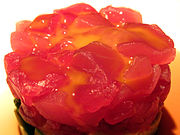Quail eggs

Quail eggs are considered a delicacy in many parts of the world, including Asia, Europe, and North America. In Japanese cuisine, they are sometimes used raw or cooked as tamago in sushi and often found in bento lunches.

In some other countries, quail eggs are considered less exotic. In Colombia, Ecuador and Venezuela, a single hard-boiled quail egg is a common topping on hot dogs and hamburgers, often fixed into place with a toothpick. In the Philippines, kwek-kwek is a popular street food delicacy, which consists of soft-boiled quail eggs dipped in orange-colored batter before being skewered and deep-fried. In Indonesia, small packages of hardboiled quail eggs are often found to be sold by street vendors as snacks, while skewered quail eggs sold as satay to accompany main dishes, such as soto and bubur ayam. In Vietnam, bags of boiled quail eggs are sold on street stalls as inexpensive beer snacks.[1] In South Korea, large, inexpensive bags of boiled quail eggs are sold in grocery stores.
In some Parts of Western Africa (Nigeria), the Easterners (igbos) call the quail egg "Ogazi Egg" and it is a common delicacy in every part of the country. The eggs are usually hawked at cheap prices by vendors in parks and roadsides.
-
Raw quail egg yolk served over chunks of maguro (raw bluefin tuna) at a sushi restaurant in Naugatuck
-
Skewered quail eggs and chicken offal satays in Indonesia
See also
References
- ^ "Eat Cheap, Top 7 Street Foods Around the World". Backpacker Ben (travel blog). August 2010.




